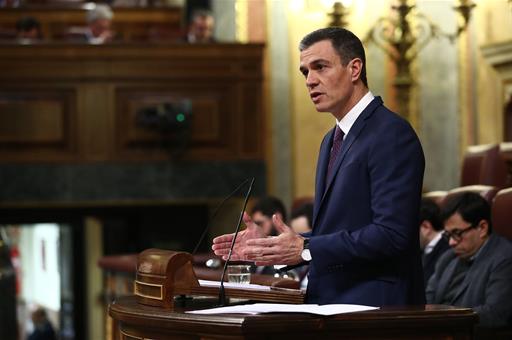Control session
Sánchez: "Strategic autonomy will be one of the priorities of the Spanish Presidency of the European Union"
President's News - 2023.1.24
Lower House of Parliament, Madrid
Pedro Sánchez has appeared in the Lower House of Parliament to report on the European Council held on 20 and 21 October 2022, and the one held later on 15 December, as well as the measures adopted by the government to deal with the economic and social consequences of Russia's invasion of Ukraine.
During his speech, the president affirmed that Spain will continue to support Ukraine throughout the duration of the occupation and afterwards in its reconstruction work. In this respect, he stressed that the government has allocated €38 million in humanitarian aid to the conflict zone and that 164,000 Ukrainians have received temporary protection and currently reside in Spain with full rights.
Furthermore, he pointed out that the EU has again shown unity, firmness and determination in the military, political, economic and humanitarian fields with the Ukrainian people. "Ukraine is not only resisting an invader, but it is resisting a reactionary discourse that questions the values of the European project".
The Chief Executive has argued that we must make the right diagnosis and not hide the risks and challenges we face from the public: "We have never sugar-coated reality, nor have we painted idyllic scenarios because the risks are there. They continue to exist and continue to have a real impact on our society".
Protecting the social majority
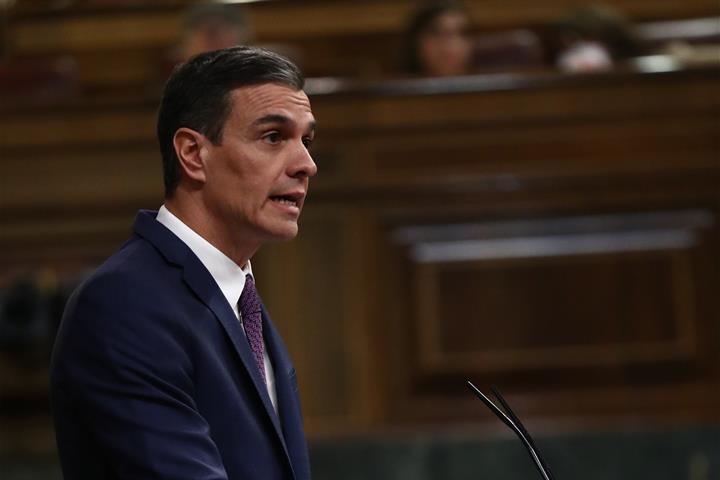 Pedro Sánchez during his appearance in the Lower House of Parliament to report on the latest meetings of the European Council and the measures adopted by the Government in response to the consequences of the war in Ukraine | Pool Moncloa / Fernando Calvo
Pedro Sánchez during his appearance in the Lower House of Parliament to report on the latest meetings of the European Council and the measures adopted by the Government in response to the consequences of the war in Ukraine | Pool Moncloa / Fernando Calvo
In the president's opinion, the essential thing is to get the direction right and focus on what matters: protecting the social majority and moving forward with useful politics that deal with people's real problems. Sánchez explained that he governs for all citizens, but forced to prioritise he will govern for the social majority that was so often relegated during the worst years of the financial crisis.
In this regard, the government will put all the resources of the state at the service of the majority and not the other way around, as it did during the pandemic. The president said that there will be increases in pensions in line with the Consumer Price Index, increases in the Minimum Interprofessional Wage, tax cuts for the middle class and workers, and tax justice to build social justice.
In addition, Pedro Sánchez has advanced that after it was made public that Spanish banks concentrate the bulk of the highest paid executives in Europe, "it is pure common sense to ask them to make a greater effort via the creation of the tax on large financial institutions".
Sánchez also defended the fact that with the social response being offered by the government, Spain has recovered its pre-pandemic level of employment in just two years.
The response to the consequences of the war has been twofold: national and European. At the national level, the president stressed that €45 billion have been mobilised. Spain has ended 2022 with an economic growth rate of over 5% and the lowest inflation in Europe, with record national insurance contribution and the lowest unemployment in the last 15 years.
At the European level, in Brussels, the Chief Executive has led measures such as the centralised purchase of gas from third countries; the promotion of renewables; the reform of the electricity market; the allocation of European funds to the green transition; intervention in the price of gas that generates electricity, the so-called "Iberian solution"; and the promotion of energy interconnections. "Today Spain is exporting solutions to the energy and price crisis, unlike 10 years ago," he said.
Strategic autonomy, a priority for the Spanish Presidency of the EU
The president argued that Spaniards feel that they are European citizens and are confident that the European project can cope with threats. In his view, it is essential to progress towards more open strategic autonomy; or in other words, the way to gain European sovereignty. This means having decision-making powers in key sectors for economic, health, defence, technological and industrial development.
Strategic autonomy will be one of the main priorities of the Spanish Presidency of the European Union in the second half of this year. "This is a challenge on which we will work to reduce vulnerabilities and strengthen our autonomy in strategic sectors," the president announced.
Pedro Sánchez added that "a just response to the crisis provoked by the war in Ukraine not only serves to protect the social majority, but it is also an investment that re-invigorates and legitimises the European project".
Spain's energy demands
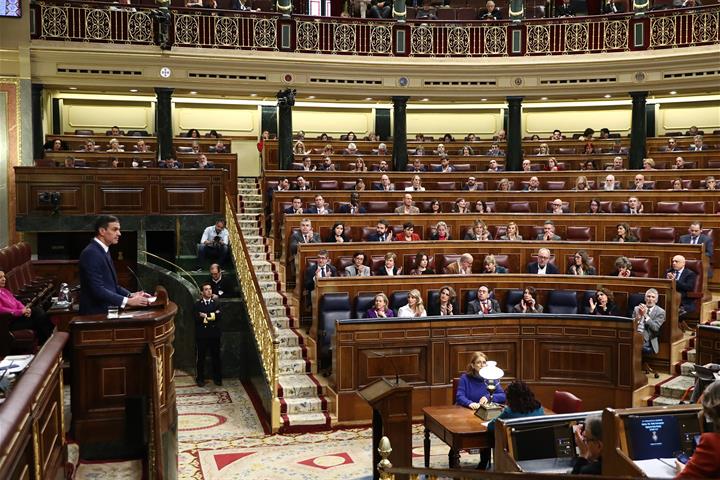 Pedro Sánchez during his appearance in the Lower House of Parliament to report on the latest meetings of the European Council and the measures adopted by the Government in response to the consequences of the war in Ukraine | Pool Moncloa / Fernando Calvo
Pedro Sánchez during his appearance in the Lower House of Parliament to report on the latest meetings of the European Council and the measures adopted by the Government in response to the consequences of the war in Ukraine | Pool Moncloa / Fernando Calvo
Two issues dominated the discussions at the European Councils in October and December 2022: energy and the European response to the US Inflation Reduction Act.
The president recalled that the European Council on 15 December approved three important regulations in the energy field. The first, the Market Correction Mechanism or cap on the price of imported gas to ensure gas supply at affordable prices; the second, the regulation to strengthen solidarity, which includes joint gas purchases and the revision of the reference indices that Europe uses to determine gas prices; and third, the regulation accelerating the deployment of renewable energies.
In the drafting, negotiation and approval of these three regulations, Sánchez maintained that "Spain's influence has been decisive", given that the agreed texts largely "respond to the demands that have been made since the beginning of the energy crisis".
In addition, the Chief Executive highlighted that the last quarter of the year saw an intensification of the European debate on the reform of the European electricity market, which Spain began to defend in September 2021, months before the Russian invasion of Ukraine.
Pedro Sánchez also stressed that Spain was the first country to submit a proposal to decouple the price of renewable energy from the price of gas: "The proposal has received strong support among the Member States".
The president also specified Spain's position on the approval by the US Government of the Inflation Reduction Act, which means that the US will allocate almost $370 million to subsidise investments in its territory linked to the ecological transition.
In his view, this objective is good for combating climate change, but "it cannot be achieved at the cost of the deindustrialisation of Europe", which is why the government is working to reach an agreement that would exclude European products from the most protectionist clauses of this law.
Last, Sánchez argued, the European Commission needs to present in the coming days a coordinated response plan to improve Europe's industrial resilience and global competitiveness, while preserving the integrity of the single market. This plan should include measures to regulate, finance and reform the state aid framework to make it more agile and adapted to the current context, and the acceleration of recovery and resilience plans.
"Crucial investments and the EU's ability to maintain its global competitiveness and industrial fabric in an international geopolitical context marked by the protectionist drift of powers such as the US, China and India are at stake," he said.
Solvency and solidarity
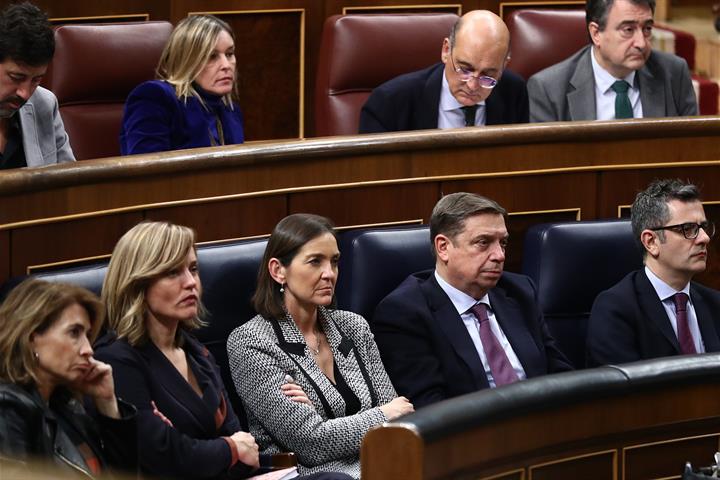 The Ministers for Transport, Mobility and the Urban Agenda, for Education and Vocational Training, for Industry, Trade and Tourism, for Agriculture, Fisheries and Food and for the Presidency, Relations with the Courts and Democratic Memory | Pool Moncloa / Fernando Calvo
The Ministers for Transport, Mobility and the Urban Agenda, for Education and Vocational Training, for Industry, Trade and Tourism, for Agriculture, Fisheries and Food and for the Presidency, Relations with the Courts and Democratic Memory | Pool Moncloa / Fernando Calvo
The president assured that Spain's voice is heard loudly in the EU because of the perseverance and seriousness with which it has worked: "We have earned credit by offering not only solvency, but also solidarity".
In an uncertain context, our country has reduced natural gas demand by 23% since August and electricity demand by more than 7%. And the "Iberian solution" has saved Spaniards more than €4.5 billion, €150 euros on average per household. The average wholesale market price was €195/MwH, 20% lower than would have been the case in the absence of this mechanism.
Protect and advance
During his speech, the President of the Government also referred to Royal Decree-Law 20/2022 on Measures to Respond to the Economic and Social Consequences of the War in Ukraine, approved by the Council of Ministers on 27 December, and which has today been validated in the Lower House of Parliament.
Support for households and small and medium-sized enterprises, industry and strategic sectors, and decisions on energy and taxation, have mobilised €45 billion of public funds and progressively alleviated the impact of price rises on households and businesses, in addition to reducing inflation levels.
"We have striven to fulfil a basic principle of action that is the true cause of our European and international prominence: to protect and to advance," said Sánchez.
Measures aimed at families and the productive fabric
Sánchez reviewed some of the measures contained in the Royal Decree-Law, such as the elimination of VAT on basic foodstuffs, free season tickets on local, commuter and medium-distance trains and the reduction in state-owned bus routes, the extension of the limitation on rent increases and the suspension of evictions of tenants without a housing alternative.
Other extended measures are the fuel discount for transporters, farmers, shipping companies and fishermen; the promotion of specific aid for large electricity consumers and the intensive gas industry; and the establishment of aid for land transport of goods and passengers, agriculture, livestock, fisheries and ceramics, with more ICO liquidity lines and direct aid and a PERTE for decarbonisation.
In the field of energy, the objective has been to lower prices and protect the most vulnerable groups, who are guaranteed the non-suspension of their electricity, water and gas supplies. The electricity social bonus has been reinforced and the thermal social bonus has been increased; a maximum price has been set for butane cylinders; and VAT and other taxes on electricity and gas have been reduced.
The tax reform includes a reduction in earned income that will benefit one in every two workers, a reduction in the taxation of the self-employed and a reduction in corporate tax for SMEs with a turnover of up to €1 million. Meanwhile, new taxes have been created to demand an additional effort from those who are the most well-off: "When an extra effort must be made in difficult times, it must be made by those who are in a much better position; that is what tax justice is all about," he said.
Spain leads economic growth in Europe
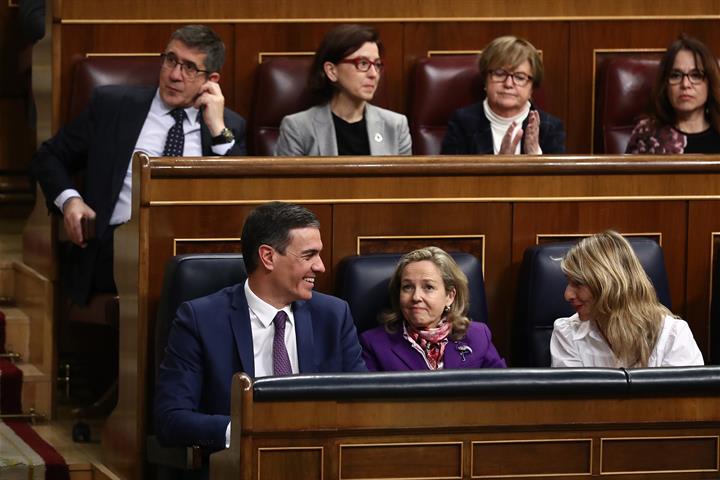 The President of the Government of Spain, Pedro Sánchez, the First Vice-President, Nadia Calviño, and the Second Vice-President, Yolanda Díaz, during the plenary session of the Lower House of Parliament | Pool Moncloa / Fernando Calvo
The President of the Government of Spain, Pedro Sánchez, the First Vice-President, Nadia Calviño, and the Second Vice-President, Yolanda Díaz, during the plenary session of the Lower House of Parliament | Pool Moncloa / Fernando Calvo
The president stated that, despite the crises caused by the pandemic and the war in Ukraine, Spain has made progress on the agenda of structural transformations that the progressive coalition government itself set at the beginning of the legislature: digital transformation and ecological transition, social and territorial cohesion, and coexistence.
According to the forecasts of the main international organisations, Spain will maintain positive growth in 2023, leading growth in Europe. Today, Spain is a trustworthy option," said Sánchez, who recalled that at the World Economic Forum held last week in Davos, one of the recurring questions of the organisers was the reasons for "Spain's economic success".
Spain, he listed, attracts foreign direct investment in sectors of the future; is a world leader in tourism; the fifth country in the world in wind power production and the eighth in renewable generation; and it hosts 20% of all projects related to green hydrogen in the world, with emblematic projects such as the H2MED interconnection between Barcelona and Marseille.
Thanks to the labour reform, almost 500,000 new jobs and 232% more permanent contracts were created during 2022, and the pension reform meant an increase in the average pension of €108 per month instead of the €2 increase that would have been applied under the previous system.
The implementation of the Recovery Plan, backed by European funds, has enabled €31 billion to be obtained for the modernisation of industry and the economy. For its part, the Addendum to the Plan will include the incorporation of an additional €94 billion in loans and transfers to reinforce the Strategic Projects or PERTES for the green and digital transition, and to create a large fund to finance priority projects in the regional governments.
Sánchez, who has assessed all this data positively, has nevertheless assured that there is still much to be done and that this government will continue to tackle the pending structural reforms and the problems that may arise from international uncertainty and instability with the same "vocation of service to the social majority".
Non official translation





